Opinion | The Risks We Face When We Embrace Anonymity
I just had a heated discussion with three friends of mine. One from the United States, one from Canada and the third from Barbados. It started with us expressing our clear and joint disdain for social media platforms that accept and publish opinions, reviews, statements and comments of users who do not identify themselves. The anonymous user.
These users post on multiple platforms, leaving reviews or comments on products, hotel stays, movies and restaurant meals. Sadly, they can even leave opinions or comments about actual persons or individuals.
While hiding behind a mask like at a masquerade ball, the anonymous commentators must feel some new-found courage to release outrage from afar. There are too many people out there who are brimming with bile and have a visceral need to release rage —all cloaked in anonymity.
The question we tossed around: People who don’t identify themselves, do they have the right to make comments, provide reviews or even make opinions on goods, services or individuals on public online platforms? Are such anonymous proclamations, observations or discourse even useful? Should we allow profane or offensive speech at any time? Should these kinds of comments be published?
We unanimously agreed. They should not be posted.
But soon, our comfortable, smug position started to fall apart. We got tarred by our own hypocrisy. I asked about the typical employee survey administered in organizations. I asked if each and every one of us, as employees, would be comfortable fully identifying ourselves on the annual employee survey.
We all said no. Why?
We spoke of the possible internal political repercussions. We discussed the fear of reprisal and possible limitations imposed on our careers. We discussed the potential for hurting feelings of fellow employees or colleagues. We just didn’t want to be caught disclosing uncomfortable observations.
We found it acceptable to hide when issues affected us directly and were close to home.
Judging from far away was easier. Judging from far away with no name attached was easiest. Hating up close was hard. Hating up close with your name written on it was even harder.
It is a little sad that we, in many ways, have trapped ourselves. So what is the best way to have hard public conversations?
Are there any face-to-face forums where we encourage criticism and listen to new voices? Are we creating the right environment so that it is easier to do?
Or do we continue to foster corporate cultures that reinforce the need for anonymity? Is management punitive when it receives critical feedback? Should we not reward suggestions for growth and improvement?
This has made me re-think journalistic sources like the historic Deep Throat, the secret informant who provided key details of President Nixon’s involvement in the Watergate scandal. Was it right to keep him anonymous?
Or the tobacco industry whistleblower, Jeffrey Wigand, who disclosed the carcinogenic and addictive substances in cigarettes. Was it right to keep him anonymous?
Should Mystery Shoppers stay a mystery? Or should they not disclose their presence like insurance loss control engineers or health and safety inspectors? Mystery only makes the mind go to dark places otherwise.
There is truth to the old adage: We shouldn’t say anything to someone behind their back we are not willing to say to their face. Vitriolic feedback, spewed by the anonymous, only destroys civility in public discourse.
I think about this every time I write my column. I do have opinions, but I put my name behind them. &








